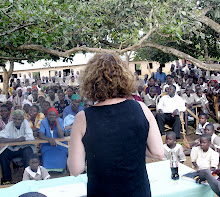
I allowed myself the idea for a couple of days that things were improving in Kenya. The "economics of truth" that my friends employ when sending me emails or talking to me on the phone I understand. They so want me to come home. And indeed I will. Yes I have my visa for Uganda and then I can buy a Kenya visa at the border. But the Rift remains a dangerous place, a place of anger and hatred simmering and boiling over leaving people terrified or worse dead. You know you've hit the big time when the Washington Post devotes 3 pages to it.
It hurts actually. I have friends in all the tribes. Would my kikuyu friends really want to kill my Luhya and Luo friends? And the jokes each tells about the other, do they really mean it. Evidently the answer is yes. The inequalities and the land grabbing have been endured long enough for people to develop an anger so acute that it doesn't look like there's any turning back.
One of my Kenyan sisters will never trust the Kikuyus again. And some of my kikuyu friends fear the Luhyas and won't go into their lands. I could tell you more, but the Washington Post has done a bang up job so I figure you should read it from them. It's all sadly true. There is no exaggeration here. Trust me I know.
By Stephanie McCrummen
Washington Post Foreign Service
Thursday, March 13, 2008; Page A01
NAKURU, Kenya -- A week after Kenya's warring political leaders signed a power-sharing agreement, Marian Wambui arrived at a camp for displaced people here, her house having been burned to the ground just two days earlier.
As President Mwai Kibaki and opposition leader Raila Odinga celebrated in Nairobi, the mother of two was wondering where in the unfamiliar sprawl she might put the two plastic bags of belongings that were all she had left in the world.
Wambui stood in the sun, facing the details of her new life: a registration tent and a light blue meal card. A long line led to workers adding fresh names to a list already 16,000 long -- mostly people from Kibaki's Kikuyu ethnic group who had been chased from their homes in this western Rift Valley region and were now living in rows of white tents in a dusty field.
"I was expecting peace, but now I don't see any peace," said Wambui, 34, who is Kikuyu, adding that she had thought she would be safe once the agreement was signed. "When I heard people talk about that deal, I was very happy," she said. "It doesn't mean anything to me now."
Kenya's volatile Rift Valley is a landscape of uprooted lives these days. Bitterness lingers, along with an almost triumphant mood among the local people who have driven out Kikuyus they perceive as privileged and arrogant.
In the town Wambui fled, young men leaning in barbershop and barroom doorways said her house had been burned in a fit of reckless jubilation after Odinga signed the deal, which one local leader described as "a cease-fire," not a settlement.
Others said flatly that if their Kikuyu neighbors return, as Kibaki has urged them to do, they will be attacked, suggesting how easily the country might slip back into the ethnic violence that killed at least 1,000 people and displaced 600,000 after the disputed Dec. 27 presidential election.
Yet with those tensions festering, neither Kibaki nor Odinga has set foot in any camps for the internally displaced or, for that matter, any Rift Valley towns since the campaign season, encouraging instead a kind of national amnesia as a means of healing.
In his first major speech since the crisis began, Kibaki urged Kenyans to "please forget the history of what happened," and Odinga instructed his followers to "forget the differences caused by the election."
But here in Nakuru and the dozens of other camps that dot the countryside, people said they could not easily forget the neighbors who chased them with machetes, killed their husbands or wives and destroyed farms and businesses that had taken decades to build.
"I'm strongly convinced that what's done cannot be undone," said a Kikuyu father of five who had just arrived at a camp for displaced people in the Rift Valley town of Naivasha and was afraid to give his name. "What I've seen, what I've heard, I think I'd be cheating to say I'm comfortable now. Where shall I go? Will I be able to resume my normal life?"
The man's new home is a roadside camp consisting of thousands of tents, where enough people arrive daily to convince others that it is not yet safe to return home.
Thursday, March 13, 2008
HittingHome
Labels:
Africa Politics Kenya,
Refugees
Subscribe to:
Post Comments (Atom)




No comments:
Post a Comment